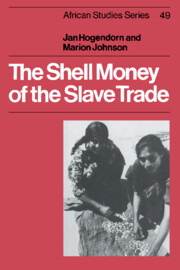Book contents
- Frontmatter
- Contents
- Maps
- Tables and chart
- Preface
- Introduction
- 1 The cowrie
- 2 The Maldive Islands
- 3 The Portuguese domination
- 4 The Dutch and English enter the trade (seventeenth century)
- 5 Prosperity for the cowrie commerce (eighteenth century)
- 6 Boom and slump for the cowrie trade (nineteenth century)
- 7 Collection, transport and distribution
- 8 Cowries in Africa
- 9 The cowrie as money: transport costs, values and inflation
- 10 The last of the cowrie
- Notes
- Bibliogaphy
- Index
5 - Prosperity for the cowrie commerce (eighteenth century)
Published online by Cambridge University Press: 12 October 2009
- Frontmatter
- Contents
- Maps
- Tables and chart
- Preface
- Introduction
- 1 The cowrie
- 2 The Maldive Islands
- 3 The Portuguese domination
- 4 The Dutch and English enter the trade (seventeenth century)
- 5 Prosperity for the cowrie commerce (eighteenth century)
- 6 Boom and slump for the cowrie trade (nineteenth century)
- 7 Collection, transport and distribution
- 8 Cowries in Africa
- 9 The cowrie as money: transport costs, values and inflation
- 10 The last of the cowrie
- Notes
- Bibliogaphy
- Index
Summary
When the slave trade prospered in the eighteenth century, the associated cowrie commerce prospered also. In 1732 John Barbot or his editors gave the whole extent of the shell trade a largely accurate overview.
The boejies or cauris … are produced and gathered among the shoals and rocks of the Maldivy islands … and are dispersed to the Dutch and English factories in India; then brought over to Europe, more especially by the Dutch, who make a great advantage of them, according to the occasion the several trading nations of Europe have for this trash, to carry on their traffic at the coast of Guinea, and of Angola; to purchase slaves or other goods of Africa, and are only proper for that trade; no other people in the universe putting such a value on them as the Guineans. … And so, proportionately to the occasion the European Guinea adventurers have for those cauris, and the quantity or scarcity there happens to be of them, either in England or Holland, their price by the hundred weight is higher or lower. … They are commonly brought over from the East-Indies, in packs or bundles, well-wrapped, and put into small barrels in England or Holland, for the better conveniency of the Guinea trade.
In India, the sub-continent's vast internal cowrie market was in many areas giving way to copper coinage and had receded into its heartland of Bengal and Orissa (although Bombay was still purchasing shells well into the nineteenth century). But these two provinces continued to absorb vast quantities in spite of the growing demand for shell money in the slave trade.
- Type
- Chapter
- Information
- The Shell Money of the Slave Trade , pp. 47 - 63Publisher: Cambridge University PressPrint publication year: 1986



